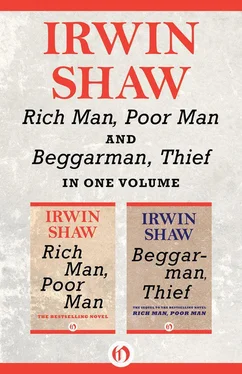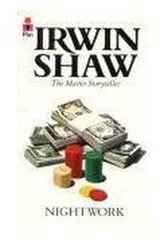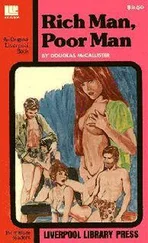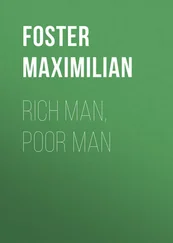He stopped typing, stood up and walked around the desk. Then he sat down again, stared at the sheet of paper in the machine and began to type again, more slowly than before.
EVEN NOW, I THINK IT WOULD BE WISER NOT TO GO INTO THE SUBJECT OF WESLEY’S OBSESSION. ALL OF US, MY MOTHER, MY UNCLE AND MYSELF, HAVE TRIED TO GET WESLEY AWAY FROM THE CÔTE D’AZUR. NONE OF US HAVE HAPPY MEMORIES OF THE PLACE, TO PUT IT MILDLY. EVEN THE FESTIVAL TURNED OUT TO BE A DISAPPOINTMENT. CONTRARY TO WHAT THE PUBLICITY MAN ON THE PICTURE PREDICTED, NOBODY WAS VOTED ANYTHING BY THE JURY AND IT’S LUCKY FOR MR. SIMPSON THAT NOBODY TOOK HIM UP ON THE BET OF HIS LEFT NUT THAT WESLEY WOULD GO HOME WITH A PRIZE. ACCORDING TO MY MOTHER, WHO IS ABOUT TO START SHOOTING HER SECOND PICTURE, WESLEY HAS REFUSED HER OFFER OF A PART, WITH A LOT OF MONEY ATTACHED TO IT, AS WELL AS OFFERS OF IMPORTANT ROLES BY OTHER COMPANIES. AS OF NOW, WESLEY IS UNDOUBTEDLY POTENTIALLY THE RICHEST DECKHAND ON THE MEDITERRANEAN. IN HIS LAST LETTER TO ME, WESLEY WROTE ME THAT WHEN HE GETS THROUGH WITH WHAT I STILL HAVE TO CALL HIS AFFAIR ON THE CÔTE, HE WILL DO ENOUGH WORK IN THE MOVIES TO SAVE UP FOR A BOAT AND SET HIMSELF UP, AS HIS FATHER DID, AS A CHARTER CAPTAIN. HE SOUNDS CHEERFUL ENOUGH IN HIS LETTERS, BUT HE MAY BE LYING, AS I DO, WHEN I WRITE TO THE FAMILY. STILL, HE’S GOT SOMETHING THAT I HAVEN’T GOT TO BE CHEERFUL ABOUT. AT EIGHTEEN HE CAME INTO ABOUT THIRTY THOUSAND DOLLARS MINUS A BIG BITE FOR THE TAX PEOPLE, AND HIS GIRL WANGLED HERSELF A JOB IN THE PARIS BUREAU OF “TIME” AND FLIES DOWN TO CANNES TO SEE HIM AS OFTEN AS POSSIBLE. HE ALSO WRITES THAT HE GETS IN A LOT OF TENNIS, EXCEPT FOR THE SUMMER MONTHS, AND BELIEVES HE COULD SWAMP ME IF HE PLAYED ME NOW. I HAVEN’T TOUCHED A RACKET SINCE JUAN-LES-PINS.
THE POLICE NEVER DID FIND OUT WHAT GEORGE’S REAL NAME WAS OR WHERE HE CAME FROM. I CAN’T GET OVER THE FEELING THAT ONE DAY I WILL LOOK UP FROM MY DESK AND SEE MONIKA STANDING THERE. I DREAM ABOUT HER CONSTANTLY AND THE DREAMS ARE EROTIC AND HAPPY AND LEAVE ME DESPERATE WHEN I WAKE UP.
« »
Billy stopped typing, frowned. “Oh, hell,” he said aloud. He took the sheet of paper out of the machine and put it with the other two sheets of paper into a large envelope to take home with him. He stood up and put on his jacket and was about to leave when he glanced down and saw the bulky envelope his uncle had sent him from Cannes. Might as well, he thought. I’ll have to read it sometime. He tore open the envelope. There was a note clipped to a page of newsprint that had been folded many times. There was a second note clipped to the back of the newspaper page. “Read the item circled in red,” was written in his uncle’s handwriting, “and then read the note on the other side.”
Billy shook his head annoyedly. Games, he thought. It wasn’t like Rudolph. Curious, he sat down so that he could put the newspaper page under the light. At the top left-hand corner of the page MARSEILLES was printed in block letters and in smaller letters, Page Deux. The column headed Faits Divers was circled in red crayon.
Mort d’un Voyou, he read, his French still serviceable. Then the story:
Last night, the body of a man, later identified by the police as that of Janos Danovic, a Yugoslav national, was found on a pier in the Vieux Port. He had been shot twice through the head. He was known to belong to the milieu along the Côte d’Azur and in Marseilles and was arrested several times for pimping and armed robbery, although he was never convicted of the crimes. Police believe that it was another incident in the settling of accounts that has been keeping them occupied in Marseilles in recent weeks.
Billy slowly put the paper down. Christ, he thought, Rudolph must be crazy to send something like this through the mails. If it had gone astray or if it had been opened accidentally, some curious bastard would have wondered why an adviser to an American senator would be interested in the murder of a small-time murderer in Marseilles, and started to make unpleasant inquiries. He was about to tear the page into small pieces when he remembered the note on the back.
He turned the page over and slipped the note out of the clip. “Look at the date on the newspaper,” his uncle had written. Billy looked at the top of the page. It was page one of Le Meridional and it was dated Samedi, 24 Octobre, 1970.
1970. Danovic had been dead over six months before Wesley had gone back to Europe. Billy leaned over his desk, his elbows on it, and put his head in his hands. He began to laugh. The laughter grew hysterical. When he finally could make himself stop, he picked up the phone and asked the night operator for Rhoda Flynn’s phone number. When she answered the phone, he said, “Hi, Rhoda, is the party still on?”
“If you can make it,” Rhoda said, “yes.”
“I’m on my way,” he said. “What’s the address?”
She told him the address and he said, “Ten minutes. Make me a stiff drink. I need it tonight.”
As he walked out of the Tribune Building and went along Michigan Avenue, looking for a taxicab, he had the feeling he was being followed. He turned around and looked, but there were just two couples half a block behind him.
Maybe, he thought, it would be a good idea if I asked Rudolph if he still has that gun. It might come in handy.
Then he saw a taxi and hailed it and got in and went to the party.
A Biography of Irwin Shaw
Irwin Shaw (1913–1984) was an award-winning American novelist, playwright, screenwriter, and short story writer. His novel The Young Lions (1948) is considered a classic of World War II fiction. From the early pages of the New Yorker to the bestseller lists, Shaw earned a reputation as a leading literary voice of his generation.
Shaw was born Irwin Shamforoff in the Bronx, New York, on February 27, 1913. His parents, Will and Rose, were Russian Jewish immigrants and his father struggled as a haberdasher. The family moved to Brooklyn and barely survived the Depression. After graduating from high school at the age of sixteen, Shaw worked his way through Brooklyn College, where he started as quarterback on the school’s scrappy football team.
“Discovered” by a college teacher (who later got him his first assignment, writing for the Dick Tracy radio serials), Shaw became a household name at the age of twenty-two thanks to his first produced play, Bury the Dead . This 1935 Broadway hit—still regularly produced around the world—is a bugle call against profit-driven barbarity. Offered a job as a Hollywood staff scriptwriter, Shaw then contributed to numerous Golden Era films such as The Big Game (1936) and The Talk of the Town (1942). While continuing to write memorable stories for the New Yorker , he also penned The Gentle People (1939), a play that was adapted for film four different times.
World War II altered the course of Shaw’s career. Refusing a commission, he enlisted in the army, and was shipped off to North Africa as a private in a photography unit in 1943. After the North African campaign, he served in London during the preparations for the invasion of Normandy. After D-Day, Shaw and his unit followed the front lines and documented many of the most important moments of the war, including the liberations of Paris and the Dachau concentration camp.
The Young Lions (1948), his epic novel, follows three soldiers—two Americans and one German—across North Africa, Europe, and into Germany. Along with James Jones’s From Here to Eternity , Joseph Heller’s Catch-22 , Norman Mailer’s The Naked and the Dead , and The Caine Mutiny by Herman Wouk, The Young Lions stands as one of the great American novels of World War II. In 1958, it was made into a film starring Marlon Brando and Montgomery Clift.
Читать дальше











